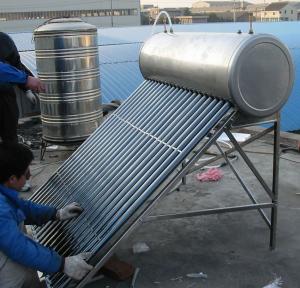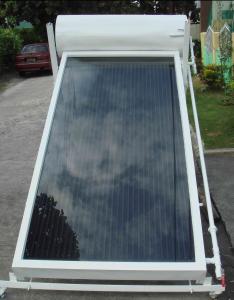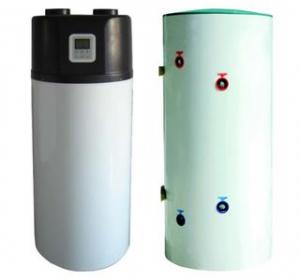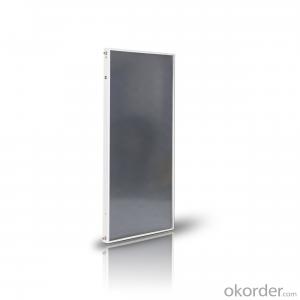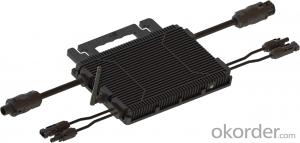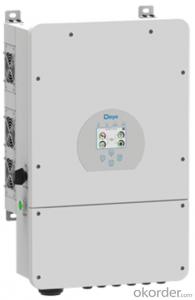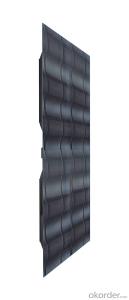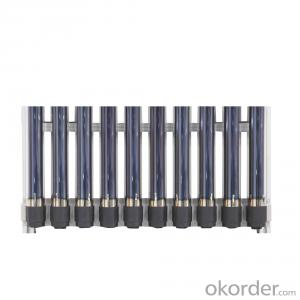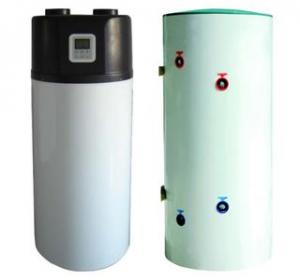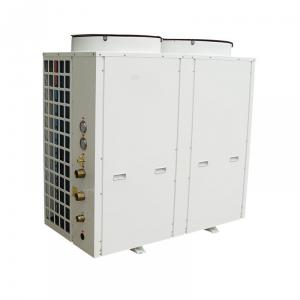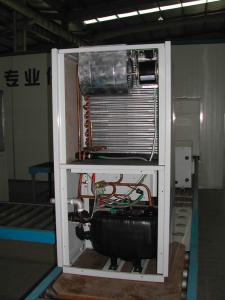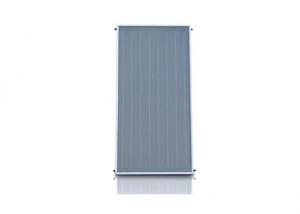Stainless Steel Non-pressure Solar Water Heaters Cheap Price
- Loading Port:
- China main port
- Payment Terms:
- TT OR LC
- Min Order Qty:
- 10 set
- Supply Capability:
- 1000 set/month
OKorder Service Pledge
OKorder Financial Service
You Might Also Like
Working Principle of Domestic Solar Water Heaters:
Solar energy, in essence, is an electromagnetic wave, a type of strong optical radiation, which is produced by thermonuclear fusion reaction. The energy of the solar radiation is transmitted through the liught of different wave length. The solar water heater is designed to mainly take in the energy of visible light & near ultra red light through the selective absorbing coating of vacuum tubes.When the water in the solar collector is heated by the solar radiation, its temperature rises. As a result, the water in the solar collector and the water in the tank form natural convection because of density contrast casued by the temperature difference. So the water of the higher temperature is incessantly forced into the insulated solar water tank( As shown in the figure).
Features
<1> Imported SUS304-2B food-level stainless steel,thickness:0.31~0.5mm
<2> Outer tank: High quality stainless steel,thickness:0.31~0.5mm
<3>Insulation: 50~55mm polyurethane foam
<4> Vacuum tube: CU/SS-AL/N red tube
<5> Frame: Stainless steel/Aluminum alloy,thickness:1.2~2mm
<6> Reflector: Stainless steel/Aluminum alloy as option
<7> Available accessories: Feeding tank,solar controller,electric heater, Mag rod,thermostatic mixing valve
Specification
ITEM.NO | SPECIFICATION | EFFECTIVE LIGHT AREA | TANK'S CAPACITY | APPLICATION PEOPLE | CBM | |||
DIAMETER OF WATER TANK | QTY OF TUBE(pcs) | DIAMETER OF TUBE | LENGTH OF TUBE | |||||
Z-NS5810 | 460mm | 10 | 58mm | 1.8m | 1.04 | 100L | 4 | 0.37 |
Z-NS5812 | 460mm | 12 | 58mm | 1.8m | 1.25 | 120L | 4-5 | 0.44 |
Z-NS5815 | 460mm | 15 | 58mm | 1.8m | 1.56 | 150L | 6 | 0.56 |
Z-NS5818 | 460mm | 18 | 58mm | 1.8m | 1.87 | 180L | 7-8 | 0.64 |
Z-NS5820 | 460mm | 20 | 58mm | 1.8m | 2.08 | 200L | 8 | 0.7 |
Z-NS5825 | 460mm | 25 | 58mm | 1.8m | 2.61 | 250L | 10 | 0.89 |
Z-NS5830 | 460mm | 30 | 58mm | 1.8m | 3.13 | 300L | 12 | 1 |
Z-NS5836 | 460mm | 36 | 58mm | 1.8m | 3.75 | 360L | 14-15 | 1.3 |
Z-NS5840 | 460mm | 40 | 58mm | 1.8m | 4.17 | 400L | 16 | 1.4 |
Z-NS5845 | 460mm | 45 | 58mm | 1.8m | 4.69 | 450L | 18 | 1.6 |
Product Details Show
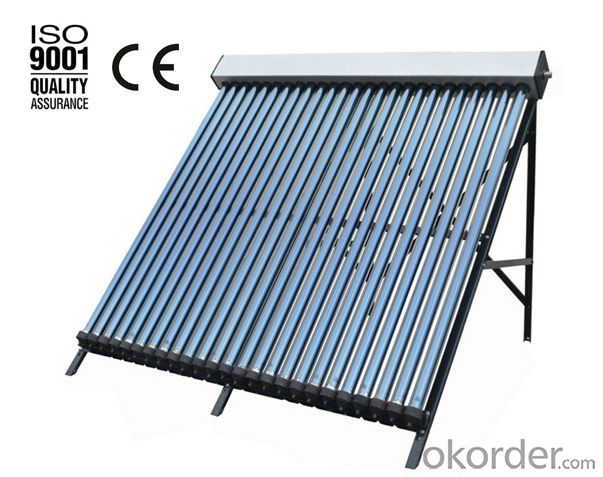
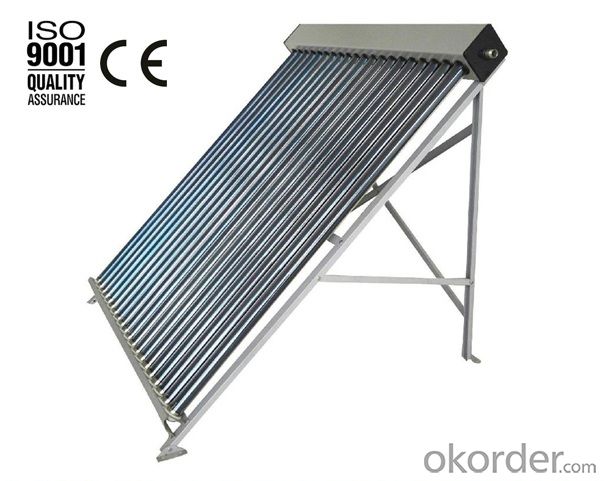
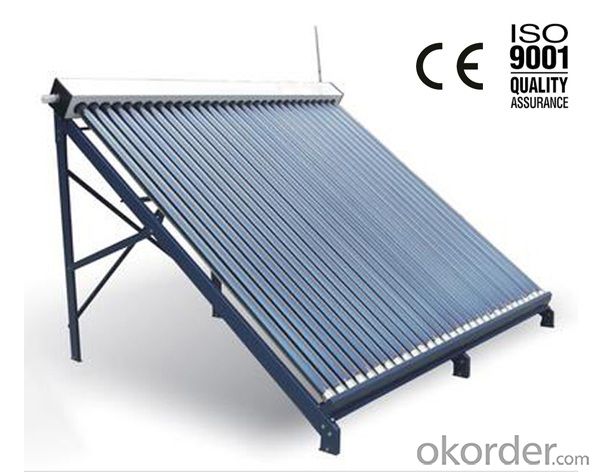
FAQ
1. Q: Are you a factory or trading company?
A: We are a factory. Especially for Solar Controller, PWM solar controller 50A12V/24V
2. Q: Where is your factory located? How can I visit there?
A: Our factory is located in Guangzhou, China. You are warmly welcomed to visit us!
3. Q: what other product you have except such Solar Lighting?
A: We have poly ,mono cells and panels. Off grid solar system, like off grid solar inverter, pure sine wave inverter, solar collector, solar controller, solar charger, Portal solar system, battery, DC Fan, Solar Led Light.
4. Q: Can the price be cheaper?
A: Of course, you will be offered a good discount for big amount.
5. How can I get a sample?
A: Please call us or send email for asking the samples.
- Q:How does the type of water being heated impact the performance of a solar water heater?
- The type of water being heated can impact the performance of a solar water heater in several ways. Firstly, the hardness of the water can affect the efficiency and lifespan of the solar collector. Hard water contains minerals that can build up and cause scaling on the collector's surface, reducing its ability to absorb and transfer heat. This scaling can also clog the pipes and reduce water flow, further impacting the heater's performance. Secondly, the temperature of the water being heated plays a role. Solar water heaters are designed to work best with moderate temperatures, typically around 120°F (49°C). If the water being heated is already at a high temperature, such as in hot climates or during summer months, the solar heater may not have to work as hard, resulting in increased efficiency. Conversely, in colder climates or during winter months, the solar heater may struggle to reach desired temperatures, leading to decreased performance. Lastly, the purity of the water can affect the performance of a solar water heater. Water with high levels of impurities, such as sediment, minerals, or chemicals, can hinder heat transfer and increase the likelihood of corrosion or damage to the system. Regular maintenance and proper water treatment can help mitigate these issues and ensure optimal performance of the solar water heater.
- Q:Are there any maintenance tasks that need to be performed on the solar panels?
- Yes, solar panels require regular maintenance tasks to ensure their optimal performance and longevity. Some common maintenance tasks include cleaning the panels to remove dirt, dust, and debris that can hinder sunlight absorption, inspecting the panels for any damage or defects, and monitoring the system's performance to identify any issues or inefficiencies. Additionally, periodic checks on the wiring, connections, and inverters are necessary to ensure proper functioning. Regular maintenance is essential for maximizing the energy production and lifespan of solar panels.
- Q:Can a solar water heater be used in areas with limited sunlight?
- While a solar water heater relies on sunlight to generate heat, it can still be used in areas with limited sunlight. However, its efficiency and performance may be affected due to reduced sun exposure. In such areas, additional heating methods or backup systems might be necessary to ensure a consistent supply of hot water.
- Q:What maintenance is required for a solar water heater?
- Regular maintenance is necessary for a solar water heater to ensure optimal performance. This includes inspecting and cleaning the solar panels, checking the fluid levels and pressure in the system, testing the temperature and pressure relief valves, and flushing the system periodically to remove any sediment or mineral buildup. Additionally, it is recommended to have a professional service the system annually to ensure all components are functioning properly.
- Q:Can a solar water heater be used for both residential and commercial purposes?
- Yes, a solar water heater can be used for both residential and commercial purposes.
- Q:What is the expected lifespan of the temperature sensors in a solar water heater?
- The expected lifespan of temperature sensors in a solar water heater can vary depending on the quality of the sensors and their usage conditions. On average, high-quality temperature sensors can last anywhere from 10 to 15 years. However, with proper maintenance and regular inspections, they may even last longer.
- Q:Can a solar water heater be used in areas with strict building height restrictions?
- Yes, a solar water heater can be used in areas with strict building height restrictions. Solar water heaters are typically installed on rooftops, which are not usually subject to height restrictions. Additionally, solar water heaters are generally compact and unobtrusive, making them a suitable option even in areas with strict building regulations.
- Q:Can a solar water heater be used in areas with limited access to oil?
- Yes, a solar water heater can be used in areas with limited access to oil. Solar water heaters rely on the sun's energy to heat water, eliminating the need for oil or any other fuel source. They are a sustainable and environmentally friendly alternative to traditional water heaters, making them a suitable option in areas where oil availability is limited.
- Q:How does the performance of a solar water heater compare to a traditional water heating system during peak demand periods?
- During peak demand periods, the performance of a solar water heater can vary depending on factors such as the availability of sunlight and the size and efficiency of the system. In general, solar water heaters can be quite effective during peak demand periods as they harness solar energy to heat water, reducing reliance on electricity or fuel. However, if there is limited sunlight or the system is not properly sized or maintained, a traditional water heating system may perform better during these periods.
- Q:Can a solar water heater be used in areas with limited access to solar radiation or sunlight due to geographical factors?
- Solar water heaters, despite being primarily designed to utilize solar radiation as their main energy source, can still be utilized in regions with restricted sunlight due to geographical factors. Nevertheless, the efficiency and effectiveness of the solar water heater may be significantly diminished in such areas. In areas with limited solar radiation, the solar water heater may not generate enough heat to meet the desired temperature requirements. This can be particularly problematic on cloudy or overcast days when the solar panels cannot capture sufficient sunlight. Nonetheless, when employing solar water heaters in regions with limited access to solar radiation, several factors need to be taken into account. Firstly, the geographical location and climate should be carefully evaluated. If the area still receives a moderate amount of sunlight throughout the year, albeit less than optimal, a solar water heater can still be a viable option. Additionally, the orientation and tilt angle of the solar panels can be adjusted to maximize the absorption of available sunlight. By positioning the panels at the optimal angle and direction, they can capture sunlight more efficiently, even in areas with reduced solar radiation. Furthermore, selecting a solar water heater with a larger collector area or capacity is crucial. This allows for better absorption and storage of the available solar energy, compensating for the limited amount of sunlight. In regions with extremely limited access to solar radiation, alternative energy sources or hybrid systems can be considered. These systems combine solar energy with other sources, such as electricity or gas, to ensure a consistent supply of hot water, even during periods of low solar radiation. In conclusion, although solar water heaters may not operate as efficiently in areas with limited access to solar radiation, they can still be utilized with specific adjustments and considerations. It is essential to assess the specific geographical factors and availability of sunlight to determine the feasibility and effectiveness of using solar water heaters in such areas.
1. Manufacturer Overview |
|
|---|---|
| Location | |
| Year Established | |
| Annual Output Value | |
| Main Markets | |
| Company Certifications | |
2. Manufacturer Certificates |
|
|---|---|
| a) Certification Name | |
| Range | |
| Reference | |
| Validity Period | |
3. Manufacturer Capability |
|
|---|---|
| a)Trade Capacity | |
| Nearest Port | |
| Export Percentage | |
| No.of Employees in Trade Department | |
| Language Spoken: | |
| b)Factory Information | |
| Factory Size: | |
| No. of Production Lines | |
| Contract Manufacturing | |
| Product Price Range | |
Send your message to us
Stainless Steel Non-pressure Solar Water Heaters Cheap Price
- Loading Port:
- China main port
- Payment Terms:
- TT OR LC
- Min Order Qty:
- 10 set
- Supply Capability:
- 1000 set/month
OKorder Service Pledge
OKorder Financial Service
Similar products
New products
Hot products
Hot Searches
Related keywords
